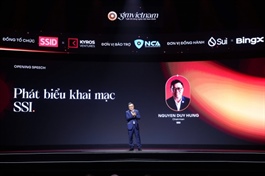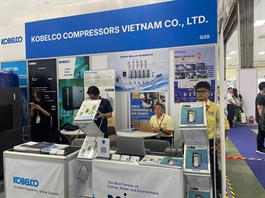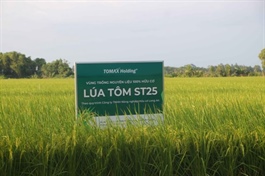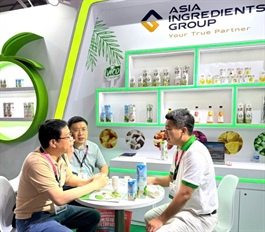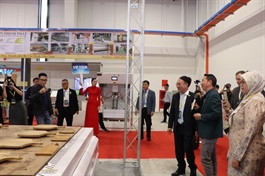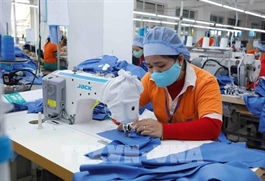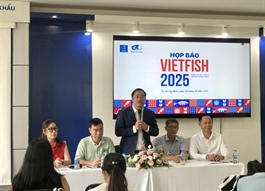Việt Nam, Malaysia strengthen ties to tap lucrative global Halal market
Việt Nam, Malaysia strengthen ties to tap lucrative global Halal market
Việt Nam and Malaysia are deepening their economic ties as the Halal food sector emerges as a strategic area for cooperation amid strong global demand, experts said at a seminar in HCM City on Thursday.
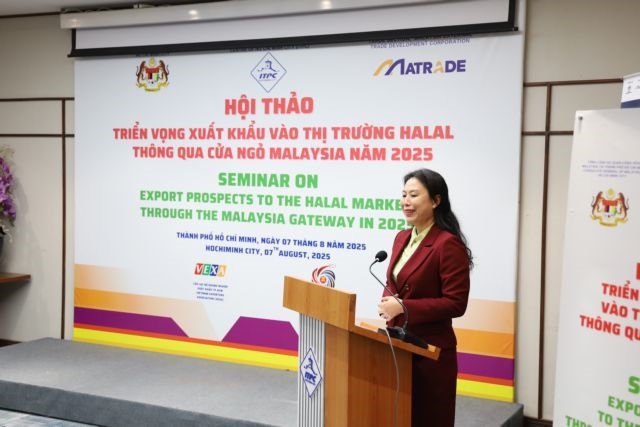
Hồ Thị Quyên, deputy director of the Investment and Trade Promotion Centre of HCM City, speaks at a seminar in HCM City on August 7. — Photo courtesy of ITPC |
Speaking at the event titled "Export Prospects to the Halal Market through the Malaysia Gateway in 2025", Hồ Thị Quyên, deputy director of the Investment and Trade Promotion Centre of HCM City (ITPC), said bilateral trade between the two countries has doubled over the past decade, rising from US$7.2 billion in 2011 to $14.2 billion in 2024.
The two sides aim to increase trade to $25 billion by 2030.
Amid globalisation and a growing Muslim population estimated at over two billion people, the Halal industry offers significant export potential for Vietnamese products, she said.
However, Quyên also pointed out several hurdles. Việt Nam currently has few authorised Halal certifiers, and certification costs remain high for small- and medium- enterprises (SMEs). Additionally, requirements such as having Muslim supervisors on-site during production pose logistical challenges.
Firdauz Othman, Consul General of Malaysia in HCM City, highlighted: “Globally, the Halal market is a dynamic and fast-growing segment of the economy. It is not only relevant to Muslims but is increasingly embraced by non-Muslim consumers who value quality, safety, ethical sourcing, and sustainability.”
He praised the Vietnamese government’s proactive approach through its ‘Project to Strengthen International Cooperation in Building and Developing Vietnam’s Halal Industry by 2030’. The initiative aims to establish Việt Nam as a reliable player in the global Halal ecosystem.
This strategic commitment by Việt Nam is particularly promising, as it aligns with the path taken by established leaders in the Halal sector, he added.
“Malaysia offers a strategic springboard for Vietnamese businesses. With its strong infrastructure, deep industry expertise and government-backed promotion platforms, Malaysia serves as both a partner and a gateway to the global Halal market,” Othman said.
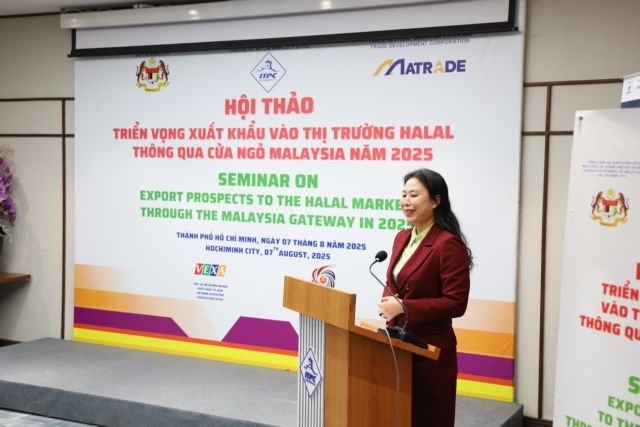
Hồ Thị Quyên, deputy director of the Investment and Trade Promotion Centre of HCM City, speaks at a seminar in HCM City on August 7. — Photo courtesy of ITPC |
Zaimah Osman, trade commissioner of the Malaysia External Trade Development Corporation (MATRADE) in HCM City, reaffirmed Malaysia’s commitment to fostering bilateral cooperation. She encouraged Vietnamese businesses to explore the diverse opportunities Malaysia offers.
MATRADE currently operates a global network of 48 offices, including ones in HCM City and Hà Nội, and is ready to provide market insights and trade advisory services to Vietnamese enterprises, she said.
Dr. Phú Văn Hẳn, vice president and general secretary of the Association of Ethnology and Anthropology of HCM City, stressed that the national Halal development project marks a strategic step to help position Việt Nam as a trustworthy player in the global Halal value chain, while facilitating domestic businesses in gaining access to and achieving deeper penetration of high-potential Halal markets.
To overcome market entry barriers, Hẳn proposed a number of solutions, including pursuing agreements with renowned Halal certifying bodies such as JAKIM (Malaysia), MUIS (Singapore) and MUI (Indonesia), developing Halal industrial parks and logistics hubs, establishing Halal training centres and university-industry linkages, digitising certification processes using blockchain technology for traceability, and building a national Halal brand: “Vietnam Halal Certified”.
Shariza binti Abdul, Halal product lead at Maybank Malaysia, said the global Halal market is forecast to reach $5 trillion by 2030, with Malaysia’s domestic market projected to hit $113.2 billion.
She pointed out that demand is outpacing supply by 80 per cent globally, creating tremendous export opportunities.
Encouragingly, Việt Nam’s Halal Certification Authority (HCA) has been officially recognised by Malaysia’s Department of Islamic Development (JAKIM), paving the way for smoother market entry.
Halal certification is not just religious, it’s a global benchmark for hygiene, ethics and sustainability, she added.
Shariza also highlighted the Salaam Market, Malaysia’s first B2B Halal e-commerce platform, as an accessible channel for Vietnamese businesses.
Additionally, the upcoming Malaysia International Halal Showcase (MIHAS), scheduled for September 17–20 in Kuala Lumpur, will provide valuable networking and promotional opportunities for Vietnamese companies.
Co-organised by ITPC, the Consulate General of Malaysia in HCM City, and MATRADE, the seminar aimed to give Vietnamese enterprises a comprehensive understanding of the Halal market and Malaysia’s pivotal role in facilitating access. It also provided insights into certification, financing and export strategies tailored to Muslim-majority markets.
- 16:45 07/08/2025



